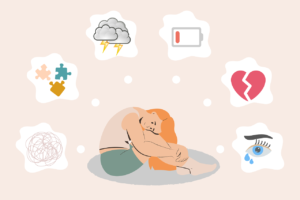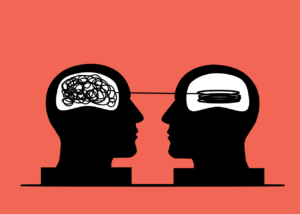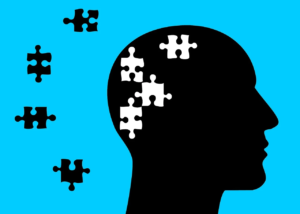
Here’s a question for you: What comes to mind when you think about pursuing a PhD? Prestige? Intellectual fulfillment? Now, think about the mental toll it might take. Drawing a blank? That’s because the mental health challenges faced by PhD students are often overlooked, even though they are as significant as the academic hurdles they encounter. This blog aims to shed light on these silent struggles and offer insights into addressing mental health challenges in PhD programs.
Mental health issues among PhD students are alarmingly prevalent. Research indicates that these students experience higher rates of anxiety, depression, and burnout compared to the general population. Casey et al. (2023) highlight that doctoral students are particularly vulnerable due to the unique pressures they face, such as intense academic workloads, prolonged periods of isolation, and financial strain. These pressures create a perfect storm of stressors that can severely impact their mental well-being.
Personal anecdotes from PhD students reveal feelings of isolation and overwhelming pressure to meet academic milestones without adequate support. One student shared, “The loneliness was crippling. I felt like I was the only one struggling, which made it even harder to reach out for help.”
Given these challenges, it’s crucial to address mental health issues in PhD programs comprehensively. By understanding the factors contributing to these problems and implementing effective support systems, both students and institutions can work towards fostering a healthier, more supportive academic environment.
This blog will explore the various mental health issues faced by PhD students, the contributing factors, and their impact on both academic performance and personal life. We will also highlight successful case studies and provide practical tips and strategies for both students and institutions to support mental well-being. Finally, we will conclude with a call-to-action, urging readers to promote awareness and support for mental health initiatives in academic settings.
Identifying Mental Health Issues

So, how do you know if what you’re experiencing is just regular stress or something more serious? Identifying mental health issues can be tricky, especially when the symptoms overlap with the typical stressors of academic life. Let’s break it down to make it clearer.
Common Symptoms and Signs of Mental Health Problems
First, let’s talk about the common symptoms. Anxiety and depression are two of the most frequent mental health problems among PhD students. Anxiety might show up as constant worry, restlessness, or feeling on edge. You might notice physical symptoms too, like a racing heart, sweating, or difficulty breathing. Depression, on the other hand, often manifests as persistent sadness, loss of interest in activities you once enjoyed, changes in appetite or sleep patterns, and feelings of hopelessness or worthlessness.
Other signs to watch out for include chronic fatigue, irritability, and difficulty concentrating. You might find yourself procrastinating more than usual or avoiding tasks altogether. These symptoms can severely impact your daily life, making it hard to keep up with academic responsibilities and personal relationships.
Differences Between Normal Stress and More Severe Issues
Now, how do you differentiate between normal stress and more severe mental health issues? Stress is a natural response to challenging situations, and a certain level of it can actually be motivating. For example, feeling nervous before a presentation or anxious about meeting a deadline is completely normal. This kind of stress typically subsides once the stressful situation is over.
However, when stress becomes chronic and starts to interfere with your ability to function, it might be a sign of a more serious issue. If you find that your anxiety or sadness is persistent and doesn’t go away even after the stressful event has passed, it’s time to take a closer look. Another red flag is when your mental health starts to impact your physical health, causing issues like constant headaches, stomach problems, or a weakened immune system.
It’s also important to consider the intensity and duration of your symptoms. Occasional feelings of overwhelm are normal, but if you’re experiencing severe symptoms that last for weeks or months, it’s crucial to seek help. Mental health issues are not just about having a “bad day” or feeling stressed out occasionally—they’re about persistent and intense feelings that disrupt your life.
Recognizing the signs and understanding the difference between normal stress and more severe mental health issues is the first step towards getting the help you need. If any of these symptoms resonate with you, don’t hesitate to reach out to a mental health professional. Your well-being is just as important as your academic success.
Factors Contributing to Mental Health Challenges
PhD programs are notorious for their intensity and high demands, which can create a breeding ground for mental health issues. Let’s explore the major factors that contribute to these challenges: academic pressure and workload, isolation and lack of social support, financial strain, and uncertain job prospects.
Academic Pressure and Workload
First and foremost, the sheer amount of academic pressure and workload that PhD students face is staggering. The pursuit of a doctoral degree is not just about attending classes and passing exams. It involves conducting original research, publishing papers, attending conferences, and teaching undergraduates, often all at the same time. The expectation to produce high-quality research that contributes to your field can be overwhelming.
PhD students frequently deal with imposter syndrome, where they feel inadequate despite their accomplishments. This can drive them to work excessively long hours, leading to burnout. The relentless pursuit of excellence and the pressure to constantly prove oneself can take a severe toll on mental health. One student confided, “I often stay up late into the night working, yet I still feel like I haven’t accomplished enough. The constant pressure feels overwhelming and unending.”
Moreover, the milestones in a PhD program—such as passing comprehensive exams, defending a dissertation proposal, and completing the dissertation—each come with their own set of stressors. The fear of failure at any of these stages can cause significant anxiety and stress. Unlike other academic programs, the timeline for completing a PhD is often uncertain, adding to the stress. This lack of a clear endpoint can make it feel like the work will never end, which is mentally exhausting.
PhD Pressure Cooker- Mastering the Mental Maze: Did you know that a whopping 32% of PhD students are at risk of developing common psychiatric disorders like depression and anxiety? According to a study in Research Policy (Levecque et al., 2017), the intense demands of academic life can take a toll on mental health. Factors like balancing work and family, job demands, leadership styles, team culture, and career uncertainties outside academia all play a role in this mental health rollercoaster. But don’t despair! One resilient student we worked with shared their secret to managing the pressure: they prioritized breaking their workload into bite-sized tasks and set realistic goals. This approach not only kept them on track but also helped them dodge the dreaded burnout. So, take a page from their book and tackle your tasks one step at a time. You’ve got this!
Isolation and Lack of Social Support
Another major factor contributing to mental health challenges among PhD students is isolation. Many students relocate to new cities or even countries to pursue their doctoral studies, leaving behind their established support networks of family and friends. This geographical separation can lead to feelings of loneliness and social isolation.
The nature of PhD work itself can be isolating. Much of the work is done independently, with long hours spent in libraries, laboratories, or in front of a computer. Unlike undergraduate or even master’s programs, where there is often a cohort of students going through the same experience together, PhD students can find themselves working in isolation. This lack of daily social interaction can lead to feelings of loneliness and depression.
Furthermore, the competitive environment of academia can exacerbate these feelings. PhD students may hesitate to share their struggles with peers out of fear of being judged or perceived as weak. The stigma surrounding mental health issues in academic settings can prevent students from seeking the support they need. One student mentioned, “I didn’t want anyone to know I was struggling. I felt like I had to keep up appearances and handle everything on my own.”
Social Support Superpower: Beat PhD Stress! Did you know that having a strong support network can be a game-changer for your mental health? According to a study in the Journal of Affective Disorders, students with robust social support are less likely to grapple with depression and anxiety (Eisenberg et al., 2007). The academic grind can be relentless, but you don’t have to face it alone. One student we worked with found solace and strength in joining a peer support group, which helped them feel less isolated and more connected. So, lean on your community and remember, support is just around the corner!
Financial Strain
Financial strain is another significant factor that impacts the mental health of PhD students. Many doctoral programs offer stipends or scholarships, but these often do not cover the full cost of living, especially in expensive cities. Students may find themselves taking on part-time jobs or relying on loans to make ends meet, adding to their stress and workload.
The financial instability that comes with pursuing a PhD can cause constant worry about making ends meet. This worry can be all-consuming, leaving little mental space for academic pursuits. The stress of living paycheck to paycheck, or the prospect of accruing significant debt, can contribute to anxiety and depression.
Moreover, the financial sacrifices made during a PhD program can strain relationships with family members who may not fully understand the demands and rewards of academic life. Explaining to loved ones why you are still in school and not earning a substantial income can be a source of stress and frustration.
Financial Stress Buster: Take Control of Your Finances! Did you know that financial stress is one of the top three stressors for PhD students? According to Ryu (2023), higher financial worries are significantly associated with increased psychological distress. This association is even more pronounced among vulnerable groups. But there’s hope! One resourceful PhD student we worked with tackled this issue head-on by applying for additional grants and fellowships and by creating a strict budget to manage their expenses. These strategies can alleviate some of the financial burdens and improve mental health. So, take charge of your finances and remember, financial peace of mind is within your reach!
Uncertain Job Prospects
Finally, uncertain job prospects post-PhD contribute significantly to the mental health challenges faced by doctoral students. The academic job market is notoriously competitive, with many PhD graduates vying for a limited number of faculty positions. This uncertainty can be a significant source of anxiety. Students invest years of their lives in their doctoral studies with the hope of securing a stable and fulfilling career. However, the reality is that many PhD graduates struggle to find positions that align with their qualifications and expectations. The pressure to publish, network, and build a strong academic CV can be immense, as students are constantly reminded of the competitive nature of the job market.
The uncertainty about future employment can lead to feelings of insecurity and self-doubt. Students may worry that they have made the wrong career choice or that their years of hard work will not pay off. One student expressed, “I’ve invested so much time and effort into my PhD, but the thought of not finding a job afterward is terrifying.” In addition to the academic job market, non-academic career paths can also be uncertain. Transitioning to industry or other sectors may require additional skills or experience, adding another layer of stress for students considering these options. The lack of clear guidance and support for non-academic career paths can leave students feeling lost and unprepared for the job market.
Career Uncertainty? Expand Your Horizons! Expand Your Horizons! Did you know that career uncertainty significantly impacts post-PhD researchers’ experiences? According to Skakni et al. (2019), career uncertainty can manifest as intellectual or occupational uncertainty, affecting both work and personal lives. This can limit future planning, restrict research expertise and networks, and induce tension between work and personal life. But don’t let this hold you back! One proactive student we worked with tackled this uncertainty by seeking career counseling and attending professional development workshops to broaden their career prospects. So, take charge of your future and explore diverse opportunities beyond academia. Remember, the world is full of possibilities!
Understanding these contributing factors is crucial for addressing the mental health challenges you face as a PhD student. Academic institutions must recognize the multifaceted nature of these issues and provide comprehensive support systems. This includes offering mental health resources, creating supportive academic environments, and providing financial assistance and career counseling. For you, acknowledging these challenges and seeking help is a vital step towards maintaining your mental well-being and achieving success in your doctoral journey.
Impact on Academic Performance and Personal Life
Mental health issues don’t just affect how you feel; they can significantly impact both your academic performance and personal life. Understanding these impacts is crucial for recognizing the importance of mental health support in PhD programs.
How Mental Health Issues Can Affect Research Productivity
Let’s start with academic performance. Research productivity is the cornerstone of a successful PhD program, but mental health issues can severely hinder your ability to conduct and complete research effectively. When you’re struggling with anxiety, depression, or burnout, your focus and concentration can take a major hit. This makes it challenging to engage deeply with complex research problems, analyze data, or even read and comprehend academic papers.
For instance, a PhD student dealing with anxiety might find themselves constantly worrying about the quality of their work, leading to perfectionism and procrastination. This can create a vicious cycle where the anxiety delays progress, and the lack of progress heightens anxiety. Similarly, depression can sap your energy and motivation, making it hard to get out of bed, let alone head to the lab or write a paper. One client we worked with shared, “I used to love diving into my research, but now I can barely muster the energy to open my laptop. Every task feels monumental.”
Sleep disturbances are common with mental health issues and can exacerbate these problems. Lack of sleep impairs cognitive function, memory, and decision-making abilities, which are critical for conducting high-level research. Moreover, consistent poor performance can lead to a loss of confidence and self-esteem, further diminishing productivity. So, make sure to catch those Z’s and give your brain the rest it needs!
How Does Mental Health Affect Your Social Life?
Mental health issues extend beyond the academic field, deeply affecting personal relationships and overall well-being. The intense demands of a PhD program often mean that personal time and social interactions take a backseat. When mental health issues enter the mix, maintaining healthy relationships becomes even more challenging. Anxiety and depression can lead to withdrawal from social activities and a reduction in communication with friends and family.
The energy required to maintain these relationships can seem overwhelming when you’re already struggling. This isolation can lead to feelings of loneliness and exacerbate mental health issues. One client shared, “I stopped going out with friends and even avoided phone calls from my family because I just didn’t have the energy to engage. It felt like I was completely alone”.
Can Your Relationship Survive PhD Stress?
Relationships with partners can also suffer. The stress and emotional strain of dealing with mental health issues can lead to increased conflicts, misunderstandings, and a lack of intimacy. Partners might struggle to understand the pressures of a PhD program and the associated mental health challenges, leading to frustration on both sides. Open communication and mutual support are essential, but these can be hard to achieve when one partner is deeply entrenched in their own struggles. One client found that attending couples therapy significantly improved their relationship. By learning to communicate more effectively and understanding each other’s perspectives, they were able to rebuild their connection and provide mutual support.
How Does Stress Impact Your Physical Health?
Physical health is also at risk. Chronic stress and mental health issues can manifest physically, leading to headaches, digestive issues, and a weakened immune system. Over time, this can result in more serious health conditions, further complicating the already challenging life of a PhD student. One client developed chronic migraines due to prolonged stress and found that their ability to conduct research and maintain personal relationships suffered greatly as a result.
This client made significant progress by incorporating regular physical activity into their routine, which helped improve both their mental and physical health. They began with simple exercises like daily walks and gradually built up to more structured workouts, which also provided a welcome break from their academic responsibilities.
Feeling Hopeless? There’s Help Available!
The cumulative effect of these issues can lead to a sense of hopelessness and despair, making it difficult to see a path forward. However, it’s important to remember that help is available. Universities are increasingly recognizing the importance of mental health support and are offering resources such as counseling services, support groups, and wellness programs. A student discovered the benefits of mindfulness and meditation through a university wellness program. By dedicating time each day to mindfulness practices, they were able to reduce their stress levels and improve their overall sense of well-being, which in turn positively impacted their academic performance.
What’s the Takeaway?
Understanding the impact of mental health issues on both academic performance and personal life highlights the necessity for comprehensive support systems. For you, acknowledging these challenges and seeking help is a vital step towards maintaining mental well-being and achieving success in your doctoral journey. For institutions, providing accessible mental health resources and fostering a supportive academic environment are crucial steps in addressing these widespread issues.
Case Studies/Examples
 Addressing mental health challenges in PhD programs is not just about recognizing the problems; it’s about implementing effective solutions. Here, we will explore examples of stages in the dissertation process where mental health support is crucial, share stories of PhD students overcoming these challenges, and highlight initiatives and programs that have shown positive results.
Addressing mental health challenges in PhD programs is not just about recognizing the problems; it’s about implementing effective solutions. Here, we will explore examples of stages in the dissertation process where mental health support is crucial, share stories of PhD students overcoming these challenges, and highlight initiatives and programs that have shown positive results.
Stages of Dissertation Process and Mental Health Support
The dissertation process is a multi-stage journey that can be incredibly taxing on mental health. Understanding the specific challenges at each stage and integrating mental health support accordingly can make a significant difference.
- Proposal Stage: At this initial stage, students are required to develop a clear and compelling research proposal. The pressure to formulate a novel research question and justify its significance can be daunting. Many students experience anxiety and self-doubt, fearing their ideas might not be good enough. Providing workshops on research design and proposal writing, along with access to academic advisors and mentors, can help alleviate some of this stress.
- Data Collection: During data collection, students often face logistical challenges and unforeseen obstacles, which can be stressful and frustrating. Long hours in the lab or field can lead to burnout. Offering flexible timelines, providing resources for data management, and ensuring regular check-ins with advisors can support students during this demanding phase.
- Analysis and Writing: Analyzing data and writing the dissertation are arguably the most challenging stages. The solitary nature of writing can exacerbate feelings of isolation, and the sheer volume of work can be overwhelming. Support groups, writing retreats, and regular feedback from advisors can help students stay motivated and connected.
- Defense and Final Submission: The final stage, defending the dissertation, brings its own set of pressures. The fear of public speaking and potential criticism can heighten anxiety. Conducting mock defenses and offering public speaking workshops can prepare students and boost their confidence.
Stories of PhD Students Overcoming Mental Health Challenges

Real-life stories of PhD students overcoming mental health challenges can be incredibly inspiring and reassuring. These stories not only provide hope but also offer practical strategies for managing similar issues. Consider the case of Ashley, a PhD student in neuroscience. Ashley struggled with severe anxiety and depression during her second year, particularly as she approached her comprehensive exams. The pressure to excel and the fear of failure were overwhelming. Recognizing her struggles, Ashely sought help from her university’s counseling services. Through regular therapy sessions and participation in a graduate student support group, Ashley learned effective coping mechanisms such as mindfulness and cognitive-behavioral strategies.
With the support of her therapist and peers, Ashley developed a structured study schedule that included regular breaks and relaxation techniques. She also practiced self-compassion, allowing herself to make mistakes without harsh self-criticism. Ashley successfully passed her comprehensive exams and continued to apply these strategies throughout her dissertation process, ultimately defending her thesis with confidence.
Another story is that of Raj, an international PhD student studying engineering. Raj faced cultural adjustment issues and homesickness, which affected his mental health and academic performance. He felt isolated and was hesitant to seek help due to the stigma surrounding mental health in his home country. However, after a particularly difficult semester, Raj reached out to an international student advisor who connected him with a culturally sensitive counselor.
Raj found great relief in talking to someone who understood his cultural background. He joined a support group for international students, where he shared experiences and coping strategies with peers facing similar challenges. Raj also engaged in community activities, which helped him build a support network and feel more at home. His mental health improved significantly, and he was able to focus better on his research, leading to successful completion of his degree.
Initiatives and Programs That Have Shown Positive Results
Several initiatives and programs have been implemented to support PhD students’ mental health, demonstrating positive outcomes.
- Peer Support Groups: Many universities have established peer support groups where students can share their experiences and offer mutual support. These groups provide a safe space to discuss challenges and reduce feelings of isolation. One example is the “PhD Balance” initiative, which offers online and in-person support groups, fostering a sense of community among doctoral students.
- Mental Health Workshops: Workshops focusing on stress management, mindfulness, and resilience are becoming increasingly common. For instance, the “Thrive at Harvard” program includes workshops on mindfulness and cognitive-behavioral techniques, helping students develop tools to manage stress and maintain mental well-being throughout their PhD journey.
- Writing Retreats: Writing retreats offer students a dedicated time and space to focus on their dissertations while receiving support from peers and facilitators. These retreats often include sessions on writing techniques, time management, and self-care practices. Programs like the “Shut Up & Write!” initiative have been praised for creating a productive and supportive environment for PhD students.
- Counseling and Psychological Services: Access to professional mental health services is crucial. Universities like Stanford and MIT have expanded their counseling services to include specific programs for graduate students, ensuring that they receive the tailored support they need. These services often include individual counseling, group therapy, and emergency support.
One client we worked with benefitted greatly from attending a writing retreat. Struggling with writer’s block and isolation, they found the retreat provided both a structured environment and a supportive community. The combination of dedicated writing time and peer interaction helped them make significant progress on their dissertation and improved their overall well-being.
Tips/Strategies/Steps

Pursuing a PhD can often feel like an intense marathon filled with unexpected hurdles. But don’t worry—you’re not alone, and there are plenty of ways to make the journey easier. Here are some fun and creative tips to help you take care of your mental health throughout your doctoral studies.
For Students
Seeking Help: Counseling Services, Support Groups, and Online Resources
First up, don’t be shy about seeking help. Think of it like assembling your superhero squad—everyone needs backup! Universities often offer counseling services that can provide a safe space to talk about your struggles. Whether you’re dealing with anxiety, stress, or just feeling overwhelmed, a professional counselor can help you develop coping strategies. One PhD student likened their counselor to their “academic therapist,” who helped them untangle their thoughts and build resilience.
Support groups are another great resource. Picture it as your own version of a PhD Avengers team—fellow students who understand exactly what you’re going through. Sharing experiences and strategies can be incredibly comforting and motivating. If in-person groups aren’t your thing, check out online communities. Websites like The Grad Cafe and forums on Reddit have bustling communities where you can find advice, share stories, and even vent a little.
Academic Editing Services
Another crucial element of support comes from academic editing services. These services can be a game-changer, providing expert assistance in refining your dissertation. Working with a dissertation editor can alleviate the stress of ensuring your writing meets the highest standards. They can help you polish your work, focusing on everything from grammar to the structure and coherence of your arguments. One client we worked with said, “My dissertation editor was like a lifeline. They caught errors I missed and helped clarify my arguments, which significantly reduced my stress.”
Whether you’re in need of dissertation editing services, or an editing service for other academic works, these professionals can provide invaluable support. Make sure to look for dissertation editing services reviews to find reputable providers who can meet your needs.
Self-Care Practices: Time Management, Physical Exercise, and Hobbies
Self-care isn’t just bubble baths and face masks (though those can be great too!). Effective self-care is about taking proactive steps to maintain your mental health. Let’s start with time management. It might sound boring, but turning it into a game can make it more enjoyable. Use apps like Trello or Asana to set up a colorful, interactive schedule. Reward yourself with a treat for every task you complete. Think of it as leveling up in a video game—each completed task brings you closer to the next level (or maybe just a well-deserved coffee break).
Next, let’s talk physical exercise. It doesn’t have to be a chore. Find an activity that you genuinely enjoy. Dancing to your favorite music for 15 minutes, trying out a new sport, or even just going for a brisk walk can do wonders for your mental health. One student we worked with swore by their lunchtime dance parties as a way to shake off stress and re-energize. Finally, hobbies. Remember those things you used to love before your PhD took over your life? It’s time to bring them back. Whether it’s painting, knitting, playing an instrument, or baking, make time for activities that bring you joy. Think of it as giving your brain a well-deserved vacation from academic stress.
Building a Support Network: Peer Support, Mentors, and Family
Building a support network is like crafting a quilt—each piece adds warmth and comfort. Start with peer support. Your fellow PhD students are your comrades-in-arms. Set up regular coffee chats or study groups. Even virtual meetups can provide much-needed human interaction. One group of students we know started a “PhD and Chill” movie night every Friday to unwind and bond. Mentors are another crucial piece of your support network. They’ve been through the trenches and can offer valuable advice and perspective. Don’t be afraid to reach out to multiple mentors for different aspects of your journey. One might be great for academic advice, while another could help with work-life balance.
And let’s not forget family. They might not fully understand the academic pressures you’re facing, but they care about you and want to help. Keep them in the loop about your progress and struggles. Sometimes, just talking about what you’re going through can lift a weight off your shoulders. Plus, who doesn’t appreciate a surprise care package from home? Managing mental health during a PhD program requires a mix of seeking professional help, practicing self-care, and building a strong support network. By integrating these fun and creative strategies into your routine, you can make the journey more enjoyable and less overwhelming. Remember, you’re not alone on this path—there’s a whole community of support out there ready to help you succeed.
For Institutions
 Creating a supportive environment for PhD students isn’t just beneficial; it’s essential. Institutions play a crucial role in shaping the academic journey and well-being of their students. Here are some effective strategies institutions can implement to support mental health.
Creating a supportive environment for PhD students isn’t just beneficial; it’s essential. Institutions play a crucial role in shaping the academic journey and well-being of their students. Here are some effective strategies institutions can implement to support mental health.
Implementing Mental Health Policies
First, institutions should establish clear and comprehensive mental health policies. Think of this as setting the foundation for a supportive academic environment. Policies should outline the university’s commitment to mental health, detailing procedures for accessing support and accommodations. These policies need to be easily accessible and well-publicized so that students are aware of the resources available to them.
Providing Resources and Support Services
Next, institutions should offer a range of mental health resources and support services. Counseling services, peer support groups, and wellness workshops are all vital components. Creating dedicated spaces equipped with resources for relaxation and stress relief, such as guided meditation recordings, yoga mats, and comfortable seating, can make a significant difference. These spaces allow students to take a break from their demanding schedules and recharge.
Online resources are also crucial. Virtual counseling services and teletherapy options can make mental health support more accessible, especially for students who may feel stigmatized or uncomfortable seeking help in person.
Training Faculty and Staff to Recognize and Respond to Mental Health Issues
Finally, training faculty and staff to recognize and respond to mental health issues is paramount. Professors and advisors often serve as the first point of contact for struggling students. Training programs should equip faculty and staff with the skills to identify signs of mental distress and provide appropriate support or referrals. This training ensures that the entire academic community is prepared to foster a supportive environment.
By implementing comprehensive mental health policies, providing a variety of support services, and training faculty and staff, institutions can create a nurturing environment that promotes the mental well-being of PhD students. These steps are essential for helping students manage the pressures of their academic journey and achieve success.
Final Thoughts
 Pursuing a PhD is like setting off on an exciting adventure—full of discovery and intellectual growth, but also lined with unexpected challenges. Among these, mental health is a crucial aspect that often gets overlooked. It’s not just an afterthought; it plays a significant role in your overall success. By addressing mental health head-on, you can shift from merely surviving to truly thriving in your academic endeavors.
Pursuing a PhD is like setting off on an exciting adventure—full of discovery and intellectual growth, but also lined with unexpected challenges. Among these, mental health is a crucial aspect that often gets overlooked. It’s not just an afterthought; it plays a significant role in your overall success. By addressing mental health head-on, you can shift from merely surviving to truly thriving in your academic endeavors.
Mental health issues can profoundly impact both your academic performance and personal life, affecting research productivity and straining relationships. However, the good news is that there are strategies and support systems available to help you navigate these challenges effectively.
If you’re a PhD student, remember that it’s perfectly okay to ask for help. Think of it as equipping yourself with the best tools for your journey. Counseling services, support groups, and online resources are there for a reason—use them! Self-care isn’t just a buzzword; it’s a necessity. Time management, physical exercise, and hobbies can all play a vital role in keeping you balanced and focused. And don’t forget to lean on your support network—peers, mentors, and family. They can provide perspective, encouragement, and a much-needed break from the academic grind.
For institutions, your role is pivotal in shaping a supportive environment. Implementing comprehensive mental health policies, providing resources, and training faculty and staff are all essential steps. Creating a culture where mental health is prioritized helps ensure that students don’t just survive their PhD journey, but actually thrive.
Call to Action for Readers to Share the Blog and Spread Awareness
Here’s where you come in. Whether you’re a student, a professor, or someone who cares about the mental well-being of PhD students, you can help make a difference. Share this blog with your friends, colleagues, and academic communities. The more we talk about mental health, the more we can break down the stigma and encourage those in need to seek help. Let’s make this a community effort. Share your own stories, tips, and experiences in the comments. What has helped you manage the pressures of a PhD program? What resources do you think are indispensable? By sharing our collective knowledge and experiences, we can create a more supportive and understanding environment for everyone.
Remember, this journey is tough, but you don’t have to go it alone. There’s a whole community ready to support you, and together, we can make a real difference. Happy studying, and take care of yourself—you’ve got this!
References
Casey, Chloe & Taylor, Julia & Knight, Fiona & Trenoweth, Steve. (2023). Understanding the Mental Health of Doctoral Students. Encyclopedia. 3. 1523-1536. 10.3390/encyclopedia3040109.
Estupiñá, F. J., Santalla, A., Prieto-Vila, M., Sanz, A., & Larroy, C. (2024). Mental health in doctoral students: Individual, academic, and organizational predictors.
Psicothema, 36(2), 123-132. https://doi.org/10.7334/psicothema2023.156
Levecque, K., Anseel, F., De Beuckelaer, A., Van der Heyden, J., Gisle, A. (2017).
Work organization and mental health problems in PhD students,
Research Policy, 46 (4). https://doi.org/10.1016/j.respol.2017.02.008.
Ryu, S., & Fan, L. (2023). The Relationship Between Financial Worries and Psychological Distress Among U.S. Adults. Journal of family and economic issues, 44(1), 16–33. https://doi.org/10.1007/s10834-022-09820-9
Skakni, I., Moreno, M., & Corcelles, M., & McAlpine, L. (2019). Hanging tough: Post-PhD researchers dealing with career uncertainty. Higher Education Research and Development. 10.1080/07294360.2019.1657806.